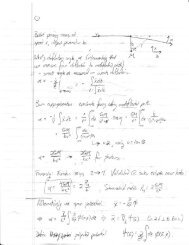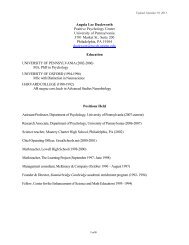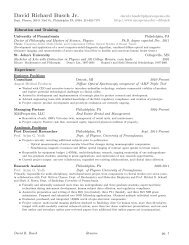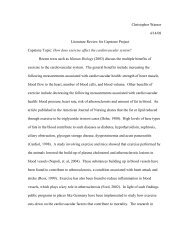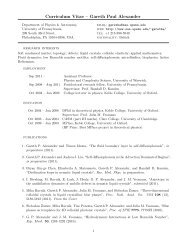A. W. Price, Virtue and Reason in Plato and Aristotle
A. W. Price, Virtue and Reason in Plato and Aristotle
A. W. Price, Virtue and Reason in Plato and Aristotle
You also want an ePaper? Increase the reach of your titles
YUMPU automatically turns print PDFs into web optimized ePapers that Google loves.
A. W. <strong>Price</strong>, <strong>Virtue</strong> <strong>and</strong> <strong>Reason</strong> <strong>in</strong> <strong>Plato</strong> <strong>and</strong> <strong>Aristotle</strong><br />
<strong>Virtue</strong> <strong>and</strong> <strong>Reason</strong> <strong>in</strong> <strong>Plato</strong> <strong>and</strong> <strong>Aristotle</strong> by <strong>Price</strong>, A. W.<br />
Review by: Susan Sauvé Meyer<br />
Ethics, Vol. 123, No. 3 (April 2013), pp. 572-577<br />
Published by: The University of Chicago Press<br />
Stable URL: http://www.jstor.org/stable/10.1086/670362 .<br />
Accessed: 07/06/2013 10:29<br />
Your use of the JSTOR archive <strong>in</strong>dicates your acceptance of the Terms & Conditions of Use, available at .<br />
http://www.jstor.org/page/<strong>in</strong>fo/about/policies/terms.jsp<br />
.<br />
JSTOR is a not-for-profit service that helps scholars, researchers, <strong>and</strong> students discover, use, <strong>and</strong> build upon a wide range of<br />
content <strong>in</strong> a trusted digital archive. We use <strong>in</strong>formation technology <strong>and</strong> tools to <strong>in</strong>crease productivity <strong>and</strong> facilitate new forms<br />
of scholarship. For more <strong>in</strong>formation about JSTOR, please contact support@jstor.org.<br />
.<br />
The University of Chicago Press is collaborat<strong>in</strong>g with JSTOR to digitize, preserve <strong>and</strong> extend access to Ethics.<br />
http://www.jstor.org<br />
This content downloaded from 165.123.34.86 on Fri, 7 Jun 2013 10:29:31 AM<br />
All use subject to JSTOR Terms <strong>and</strong> Conditions
572 Ethics April 2013<br />
<strong>in</strong> behavioral economics, a diverse range of new rational actor models is emerg<strong>in</strong>g,<br />
often with more unorthodox utility functions, <strong>in</strong>clud<strong>in</strong>g altruistic preferences,<br />
group identity, image concerns, <strong>and</strong> so forth, <strong>and</strong> with agents that operate under<br />
uncerta<strong>in</strong>ty, have limited memory, or are not perfect Bayesians. Nevertheless, most<br />
of these models are rational actor models because they make the basic assumptions<br />
that agents behave as if they were maximiz<strong>in</strong>g their utility, given certa<strong>in</strong><br />
constra<strong>in</strong>ts. Ab<strong>and</strong>on<strong>in</strong>g all the theoretical <strong>and</strong> empirical advances made <strong>in</strong> the<br />
model<strong>in</strong>g of rational actors would be throw<strong>in</strong>g out the baby with the bathwater.<br />
Fram<strong>in</strong>g Democracy asks important questions about the impact of fram<strong>in</strong>g effects<br />
on democratic theory. It offers an <strong>in</strong>sightful review of the exist<strong>in</strong>g fram<strong>in</strong>g<br />
literature <strong>and</strong> a useful taxonomy of theories of democracy. I am less conv<strong>in</strong>ced<br />
that Kelly succeeds <strong>in</strong> apply<strong>in</strong>g the fram<strong>in</strong>g literature <strong>in</strong> the context of democracy.<br />
The evidence available does not allow us to draw many substantial conclusions<br />
about the outcomes of democratic processes, lead<strong>in</strong>g to speculations that are occasionally<br />
rather far-fetched. This notwithst<strong>and</strong><strong>in</strong>g, closer attention to the behavioral<br />
sciences is likely to transform democratic theory, open<strong>in</strong>g up new avenues<br />
of research. In that regard, Kelly’s book po<strong>in</strong>ts us <strong>in</strong> the right direction.<br />
Kai Spiekermann<br />
London School of Economics<br />
<strong>Price</strong>, A. W. <strong>Virtue</strong> <strong>and</strong> <strong>Reason</strong> <strong>in</strong> <strong>Plato</strong> <strong>and</strong> <strong>Aristotle</strong>.<br />
Oxford: Clarendon Press, 2011. Pp. 356. $85.00 ðclothÞ.<br />
This is not a book that the typical user will read from cover to cover. It weighs <strong>in</strong><br />
on a very large number of issues concern<strong>in</strong>g the two core notions <strong>in</strong> the ethics of<br />
<strong>Plato</strong> <strong>and</strong> <strong>Aristotle</strong>—virtue <strong>and</strong> happ<strong>in</strong>ess—with an emphasis on topics <strong>in</strong> practical<br />
reason<strong>in</strong>g ðwhich connects these two notionsÞ <strong>and</strong> its breakdown ðacrasiaÞ.<br />
In its scope, philosophical <strong>in</strong>dependence, <strong>and</strong>—alas—the stra<strong>in</strong>s it places on the<br />
reader, it bears comparison with Sarah Broadie’s magisterial Ethics with <strong>Aristotle</strong><br />
ðNew York: Oxford University Press, 1991Þ, although <strong>Price</strong>’s tone is considerably<br />
lighter <strong>and</strong> his exposition more compact than Broadie’s. In alternat<strong>in</strong>g chapters<br />
on parallel topics <strong>in</strong> <strong>Plato</strong> <strong>and</strong> <strong>Aristotle</strong>, <strong>Price</strong> moves seamlessly between detailed textual<br />
scrut<strong>in</strong>y, flights of philosophical logic, <strong>and</strong> susta<strong>in</strong>ed engagement with scholarly<br />
op<strong>in</strong>ion, both views he endorses <strong>and</strong> those he rejects. The result is alternately<br />
provocative, delightful, <strong>and</strong> madden<strong>in</strong>g <strong>in</strong> its tendency to defer a clear statement<br />
of the issue at stake <strong>in</strong> a complicated stretch of argument until it is over. Peppered<br />
with elegant <strong>and</strong> memorable phrases, such as the remark that <strong>Aristotle</strong>’s advocacy<br />
of the contemplative life is “dem<strong>and</strong><strong>in</strong>g, not demented” ð202Þ, it is <strong>in</strong>formed by a<br />
salutary <strong>and</strong> explicit recognition of the pr<strong>in</strong>ciple that the plausibility of a philosophical<br />
position is a dist<strong>in</strong>ct issue from whether it is <strong>Aristotle</strong>’s.<br />
If it is possible to identify the core thesis of so wide-rang<strong>in</strong>g a discussion, it is<br />
that <strong>Aristotle</strong> is a faithful heir to <strong>Plato</strong> <strong>and</strong> that a proper appreciation of his moral<br />
psychology reveals him to be a cognitivist about emotions <strong>and</strong> a contextualist <strong>and</strong><br />
anti-Humean about practical reason<strong>in</strong>g. The latter thesis is the burden of <strong>Price</strong>’s<br />
sixth chapter ðchap. C2Þ, <strong>and</strong> concerns some of the most hotly contested issues<br />
This content downloaded from 165.123.34.86 on Fri, 7 Jun 2013 10:29:31 AM<br />
All use subject to JSTOR Terms <strong>and</strong> Conditions
Book Reviews 573<br />
<strong>in</strong> recent discussions of <strong>Aristotle</strong>’s ethics. That chapter will be the focus of the rest<br />
of this review.<br />
Questions about practical reason<strong>in</strong>g are central to the <strong>in</strong>terpretation of <strong>Aristotle</strong>’s<br />
ethics because <strong>Aristotle</strong> takes the virtues of character to <strong>in</strong>volve phronesis<br />
ðpractical wisdomÞ, which is excellence at the sort of reason<strong>in</strong>g that issues <strong>in</strong> action<br />
ðpraxisÞ. We may call this k<strong>in</strong>d of reason<strong>in</strong>g practical. <strong>Aristotle</strong> demarcates it<br />
both from theoretical <strong>and</strong> from technical reason<strong>in</strong>g. Like the latter, <strong>and</strong> dist<strong>in</strong>ct<br />
from the former, it is deliberative—that is, it is reason<strong>in</strong>g <strong>in</strong> the light of ðprosÞ a<br />
goal. What dist<strong>in</strong>guishes practical from technical reason<strong>in</strong>g, however, is disputed<br />
among <strong>in</strong>terpreters of <strong>Aristotle</strong>. In Nicomachean Ethics ðENÞ VI 5 we are told that<br />
technical reason<strong>in</strong>g proceeds from a particular ðkata merosÞ goal—for example,<br />
health <strong>in</strong> the case of the doctor <strong>and</strong> shoes <strong>in</strong> the case of the cobbler—whereas the<br />
phronimos ðthe person of practical wisdomÞ has ‘liv<strong>in</strong>g well <strong>in</strong> general’ as his goal.<br />
Now <strong>Aristotle</strong> notes <strong>in</strong> EN I 4 that ‘liv<strong>in</strong>g well’ <strong>and</strong> ‘do<strong>in</strong>g well’ are synonyms for<br />
‘happ<strong>in</strong>ess’ ðeudaimoniaÞ. Thus he takes practical wisdom to be a matter of deliberat<strong>in</strong>g<br />
with a view to happ<strong>in</strong>ess. S<strong>in</strong>ce, however, ‘happ<strong>in</strong>ess’ has distract<strong>in</strong>g connotations<br />
for many contemporary readers, I will frame the debate <strong>in</strong> terms of ‘liv<strong>in</strong>g<br />
well’.<br />
Accord<strong>in</strong>g to one school of <strong>in</strong>terpretation that has come under attack <strong>in</strong> recent<br />
decades, the phronimos has a substantial conception of what liv<strong>in</strong>g well consists<br />
<strong>in</strong>, <strong>and</strong> deliberation is a matter of apply<strong>in</strong>g it to the particular circumstances<br />
<strong>in</strong> which one acts—<strong>in</strong> much the same way that, <strong>in</strong> <strong>Aristotle</strong>’s textbook example of<br />
deliberation, the medical doctor has an underst<strong>and</strong><strong>in</strong>g of what health consists <strong>in</strong><br />
<strong>and</strong> deliberates about how to br<strong>in</strong>g it about <strong>in</strong> a patient. Aga<strong>in</strong>st this, John Mc-<br />
Dowell ð“The Role of Eudaimonia <strong>in</strong> <strong>Aristotle</strong>’s Ethics,” <strong>in</strong> Essays on <strong>Aristotle</strong>’s<br />
Ethics, ed. A. O. Rorty ½Berkeley: University of California Press, 1980Š, 359–76Þ <strong>and</strong><br />
more recently Sarah Broadie ð<strong>in</strong> Ethics with <strong>Aristotle</strong>Þ have <strong>in</strong>sisted that <strong>Aristotle</strong>’s<br />
phronimos has no such “gr<strong>and</strong> end” ðBroadie’s phraseÞ <strong>in</strong> view. <strong>Price</strong> throws his lot<br />
<strong>in</strong> with Broadie <strong>and</strong> offers his own proposal as an elucidation of hers, which he<br />
comb<strong>in</strong>es with an extremely helpful analysis of the relation between Broadie’s<br />
<strong>and</strong> McDowell’s positions, argu<strong>in</strong>g that the difference is one of emphasis rather<br />
than substance. In this <strong>Price</strong>’s contribution to the debate is a valuable addition<br />
to Richard Kraut’s enormously lucid clarification of Broadie’s position ð“In Defense<br />
of the Gr<strong>and</strong> End,” Ethics 103 ½1993Š: 361–74Þ, although I shall argue that <strong>Price</strong><br />
does not succeed <strong>in</strong> mak<strong>in</strong>g a conv<strong>in</strong>c<strong>in</strong>g case for that position.<br />
Follow<strong>in</strong>g Broadie, <strong>Price</strong> ma<strong>in</strong>ta<strong>in</strong>s that deliberation with a view to liv<strong>in</strong>g well<br />
always happens <strong>in</strong> conjunction with deliberation about how to realize a much more<br />
restricted <strong>and</strong> determ<strong>in</strong>ate end—for example, to repay a debt. In what we may call<br />
“textbook” or “explicit” deliberation, the phronimos considers what it would take<br />
to realize this end <strong>in</strong> her specific circumstances; thus she may determ<strong>in</strong>e, for example,<br />
that go<strong>in</strong>g to the bank <strong>and</strong> mak<strong>in</strong>g a withdrawal will do the trick. Hav<strong>in</strong>g<br />
arrived at this conclusion, however, <strong>Price</strong> <strong>in</strong>sists, the phronimos does not necessarily<br />
go ahead <strong>and</strong> act on it, for she will evaluate the specific means she has identified<br />
<strong>in</strong> the light of other values or ends that she has. For example, mak<strong>in</strong>g the<br />
requisite withdrawal from the bank might leave no money for food, <strong>in</strong> which case<br />
ðother th<strong>in</strong>gs be<strong>in</strong>g equalÞ a good parent will postpone the repayment rather than<br />
have her children go hungry. The goal of the explicit deliberation ðrepay<strong>in</strong>g the<br />
This content downloaded from 165.123.34.86 on Fri, 7 Jun 2013 10:29:31 AM<br />
All use subject to JSTOR Terms <strong>and</strong> Conditions
574 Ethics April 2013<br />
debtÞ is thus provisional <strong>and</strong> will be reta<strong>in</strong>ed only if the means for implement<strong>in</strong>g<br />
it survive this evaluative scrut<strong>in</strong>y. <strong>Price</strong> claims that this latter k<strong>in</strong>d of scrut<strong>in</strong>y is<br />
what deliberat<strong>in</strong>g with a view to ‘liv<strong>in</strong>g well’ consists <strong>in</strong>, for <strong>Aristotle</strong>. We may call<br />
it ‘<strong>in</strong>direct’ or ‘implicit’ deliberation—<strong>in</strong> that the deliberator does not explicitly<br />
ask “what shall I do <strong>in</strong> order to live well?” yet consistently tracks that goal <strong>in</strong> evaluat<strong>in</strong>g<br />
her options.<br />
<strong>Price</strong> takes this to be the sort of deliberation that goes wrong <strong>in</strong> <strong>Aristotle</strong>’s<br />
example of the adulterer <strong>in</strong> EN VI 9: the adulterer deliberates explicitly <strong>in</strong> the<br />
light of a provisional goal ðsay, sexual gratificationÞ; textbook deliberation identifies<br />
seduc<strong>in</strong>g his married neighbor as a way of achiev<strong>in</strong>g this end, <strong>and</strong> the evaluative<br />
reason<strong>in</strong>g proceed<strong>in</strong>g <strong>in</strong> t<strong>and</strong>em with this explicit deliberation fails to flag<br />
this option as unacceptable ð193, 205, 222Þ. While I am skeptical that this is the<br />
moral <strong>Aristotle</strong> <strong>in</strong>tends us to draw <strong>in</strong> that chapter ðs<strong>in</strong>ce the adulterer is offered<br />
as an example of a deliberator whose goal is deficient, not his reason<strong>in</strong>gÞ, I th<strong>in</strong>k<br />
better textual support for <strong>Price</strong> comes from EN VI 13, where <strong>Aristotle</strong> argues that<br />
worthwhile goals do not suffice for virtue of character if they are not accompanied<br />
by phronesis. Here he <strong>in</strong>vokes the so-called natural virtues. These are dispositions<br />
to pursue ends that, unlike the adulterer’s, are generally worthwhile but<br />
are not accompanied by the ability to discern when it is <strong>in</strong>appropriate to act on<br />
them; for example, the naturally temperate person may exercise self-restra<strong>in</strong>t<br />
when aggressive action is called for.<br />
In any case, the proposal that deliberat<strong>in</strong>g about liv<strong>in</strong>g well proceeds <strong>in</strong>directly<br />
<strong>in</strong> the way that <strong>Price</strong> describes makes excellent sense of <strong>Aristotle</strong>’s comments<br />
about the virtuous person’s characteristic motivation: that she acts “for the<br />
sake of the kalon,” where the kalon is what is f<strong>in</strong>e or admirable. ðI argue for a similar<br />
proposal <strong>in</strong> “Liv<strong>in</strong>g for the Sake of an Ultimate End,” <strong>in</strong> <strong>Aristotle</strong>’s Nicomachean<br />
Ethics: A Critical Guide, ed. Jon Miller ½Cambridge: Cambridge University Press,<br />
2011Š, 47–65Þ. S<strong>in</strong>ce <strong>Aristotle</strong> argues that virtuous actions are what liv<strong>in</strong>g well<br />
consists <strong>in</strong> ðEN I 7Þ, it makes sense to suppose that, for <strong>Aristotle</strong>, deliberation about<br />
liv<strong>in</strong>g well consists <strong>in</strong> deliberat<strong>in</strong>g about how to pursue more determ<strong>in</strong>ate ends<br />
such as repay<strong>in</strong>g one’s debts, while at the same time filter<strong>in</strong>g the specific options<br />
one identifies accord<strong>in</strong>g to whether they would be kalon. ðThus McDowell attributes<br />
to <strong>Aristotle</strong> the view that a person’s conception of happ<strong>in</strong>ess is expressed <strong>in</strong><br />
his judgments about what is kalon.Þ<br />
<strong>Price</strong> presents this analysis of deliberation about liv<strong>in</strong>g well as an alternative<br />
to the so-called Gr<strong>and</strong> End view ð205Þ. However, it is <strong>in</strong> fact perfectly consistent<br />
with the Gr<strong>and</strong> End view. Surely one may accept that deliberation about liv<strong>in</strong>g<br />
well proceeds <strong>in</strong>directly <strong>and</strong> still ma<strong>in</strong>ta<strong>in</strong> that the phronimos has a substantive<br />
conception of liv<strong>in</strong>g well ðor of the kalonÞ <strong>in</strong> the light of which she evaluates particular<br />
courses of action as acceptable or unacceptable. What is wrong with say<strong>in</strong>g<br />
that, <strong>in</strong> the earlier example, the phronimos has a conception of liv<strong>in</strong>g well on<br />
which both keep<strong>in</strong>g one’s contracts <strong>and</strong> car<strong>in</strong>g for one’s children are important<br />
<strong>and</strong> worthwhile, but the latter more important than the former?<br />
I gather that the problem with this proposal, accord<strong>in</strong>g to <strong>Price</strong> ð206–9Þ, is<br />
that practical pr<strong>in</strong>ciples like those just <strong>in</strong>voked ðpay your debts, care for your<br />
childrenÞ are true only “for the most part” <strong>in</strong> <strong>Aristotle</strong>’s view, while he follows<br />
Broadie <strong>in</strong> assum<strong>in</strong>g that the conception of liv<strong>in</strong>g well <strong>in</strong>volved <strong>in</strong> hav<strong>in</strong>g a Gr<strong>and</strong><br />
End must be exhaustive <strong>and</strong> comprehensive—a “bluepr<strong>in</strong>t” for liv<strong>in</strong>g ð200–201;<br />
This content downloaded from 165.123.34.86 on Fri, 7 Jun 2013 10:29:31 AM<br />
All use subject to JSTOR Terms <strong>and</strong> Conditions
Book Reviews 575<br />
Broadie, Ethics with <strong>Aristotle</strong>, 198Þ. Accord<strong>in</strong>gly, <strong>Price</strong> counts as evidence aga<strong>in</strong>st<br />
the Gr<strong>and</strong> End view <strong>Aristotle</strong>’s failure to come anywhere close to specify<strong>in</strong>g an<br />
exhaustive, comprehensive conception of happ<strong>in</strong>ess such that it can be applied<br />
to concrete situations without deliberation ð201–4, aga<strong>in</strong>st Kraut, “In Defense of<br />
the Gr<strong>and</strong> End,” 364–66Þ. His motivation here is a sound one: to preserve the status<br />
of deliberation as a regular <strong>and</strong> ongo<strong>in</strong>g feature of the exercise of practical<br />
wisdom ðcf. Broadie, Ethics with <strong>Aristotle</strong>, 239, 251–54Þ. As <strong>Aristotle</strong> <strong>in</strong>sists, the phronimos<br />
grasps the particulars of situations, <strong>and</strong> his excellence consists <strong>in</strong> figur<strong>in</strong>g<br />
out how to act <strong>in</strong> those circumstances. Deliberation is called for to figure out what<br />
to do <strong>in</strong> situations where it is unclear how to proceed ðEN III 3 1112b2–9; cf. VI 5,<br />
1140a28–30Þ. Thus, <strong>Price</strong> ma<strong>in</strong>ta<strong>in</strong>s, the phronimos must exercise judgment <strong>in</strong> order<br />
for his practical pr<strong>in</strong>ciples to be genu<strong>in</strong>ely action-guid<strong>in</strong>g ð187, 209; cf. 174–80Þ.<br />
It is perfectly reasonable of <strong>Price</strong> to <strong>in</strong>sist, on <strong>Aristotle</strong>’s behalf, that grasp<strong>in</strong>g<br />
a set of pr<strong>in</strong>ciples about act<strong>in</strong>g well does not do away with the need to exercise<br />
judgment when decid<strong>in</strong>g what to do. But why suppose that a substantive conception<br />
of liv<strong>in</strong>g well, one that is sufficiently contentful <strong>and</strong> robust to guide one’s<br />
deliberations, must be expressed <strong>in</strong> exceptionless pr<strong>in</strong>ciples that can be applied<br />
to any concrete situation without the exercise of judgment? Surely the doctor<br />
who deliberates with a view to health does not have an underst<strong>and</strong><strong>in</strong>g of health<br />
so complete <strong>and</strong> exhaustive that no exercise of judgment is required about how<br />
to treat particular patients.<br />
Here a second set of concerns, which <strong>Price</strong> shares with McDowell, is relevant.<br />
The worry is that <strong>in</strong> cases of technical deliberation, for example <strong>in</strong> medic<strong>in</strong>e, the<br />
doctor’s conception of health ðhowever imprecise <strong>and</strong> <strong>in</strong>complete it may beÞ is<br />
based on reason<strong>in</strong>g that is entirely <strong>in</strong>dependent of desire. It tells the doctor what<br />
to do, provided he wants to cure the patient. If we suppose that the phronimos’sconception<br />
of liv<strong>in</strong>g well is like the doctor’s conception of health, then we must suppose<br />
that the conception of liv<strong>in</strong>g well that the former deploys is likewise desire<strong>in</strong>dependent.<br />
On Broadie’s version of this worry, the Gr<strong>and</strong> End view attributes<br />
to the phronimos a k<strong>in</strong>d of specialized philosophical knowledge about liv<strong>in</strong>g well<br />
that is dist<strong>in</strong>ct from the values one learns <strong>in</strong> a good upbr<strong>in</strong>g<strong>in</strong>g. To give a rough<br />
caricature of the picture that McDowell <strong>and</strong> Broadie are concerned to resist: <strong>Aristotle</strong><br />
th<strong>in</strong>ks that we have a natural <strong>and</strong> <strong>in</strong>elim<strong>in</strong>able desire for happ<strong>in</strong>ess <strong>and</strong><br />
that it is the job of reason to figure out what human happ<strong>in</strong>ess consists <strong>in</strong> ðe.g., by<br />
do<strong>in</strong>g psychology or metaphysics or natural philosophyÞ. The phronimos so conceived<br />
has not just a work<strong>in</strong>g underst<strong>and</strong><strong>in</strong>g of what is f<strong>in</strong>e ðkalonÞ that is expressed<br />
<strong>in</strong> his tra<strong>in</strong>ed patterns of affective response, but a philosophical theory of liv<strong>in</strong>g<br />
well that can be justified from a st<strong>and</strong>po<strong>in</strong>t <strong>in</strong>dependent of desire ð200–201Þ.<br />
The underly<strong>in</strong>g issue here, very much to the foreground <strong>in</strong> <strong>Price</strong>’s discussion,<br />
is a dispute among the <strong>in</strong>terpreters of <strong>Aristotle</strong> about how to defend <strong>Aristotle</strong>’s<br />
anti-Humean credentials. That <strong>Aristotle</strong> must reject Hume’s dictum that reason<br />
can only serve, not offer direction to, desire is, as <strong>Price</strong> notes, clear from his fundamental<br />
analysis of virtue of character as a condition <strong>in</strong> which the affective part<br />
of the soul follows reason ðEN I13Þ. The problem is to how to reconcile this part<br />
of <strong>Aristotle</strong>’s view with his regular <strong>in</strong>dication that desire sets the ends of practical<br />
deliberations ðEN 1139a31-b4; cf. 1144a7–9, 20–22Þ. One strategy for do<strong>in</strong>g this,<br />
which is tarred with the label “Gr<strong>and</strong> End” view, accepts the Humean dist<strong>in</strong>ction<br />
between desire <strong>and</strong> reason but seeks to show that desire is dependent on reason.<br />
This content downloaded from 165.123.34.86 on Fri, 7 Jun 2013 10:29:31 AM<br />
All use subject to JSTOR Terms <strong>and</strong> Conditions
576 Ethics April 2013<br />
It proposes that although the desire for happ<strong>in</strong>ess is not subject to rational justification,<br />
its object is highly <strong>in</strong>determ<strong>in</strong>ate, <strong>and</strong> that it is with<strong>in</strong> the competence of<br />
reason, quite <strong>in</strong>dependently of desire, to figure out what happ<strong>in</strong>ess consists <strong>in</strong>;<br />
thereby reason provides direction to desire. The Gr<strong>and</strong> End view is supposed to be<br />
the unrealistic picture of practical reason<strong>in</strong>g that results from a doomed attempt<br />
to reject Humean practical rationality while still accept<strong>in</strong>g Humean psychology.<br />
The more thoroughgo<strong>in</strong>g anti-Humean strategy favored by McDowell is to<br />
reject the Humean dist<strong>in</strong>ction between desire <strong>and</strong> reason: <strong>in</strong> practical contexts, at<br />
any rate, these are <strong>in</strong>extricably l<strong>in</strong>ked, neither separable from the other—witness<br />
<strong>Aristotle</strong>’s <strong>in</strong>sistence that excellence of the “desiderative” part of the soul <strong>in</strong>volves<br />
practical wisdom, <strong>and</strong> vice versa. While <strong>Price</strong> endorses this general strategy, he<br />
f<strong>in</strong>ds fault with McDowell’s specific proposal that deliberation about happ<strong>in</strong>ess,<br />
as <strong>Aristotle</strong> underst<strong>and</strong>s it, is a nondiscursive determ<strong>in</strong>ation <strong>in</strong> a concrete situation<br />
of what would count, <strong>in</strong> that situation, as liv<strong>in</strong>g well. Deliberation so conceived,<br />
<strong>Price</strong> worries, would <strong>in</strong>volve no reason<strong>in</strong>g ðsullogismosÞ at all, <strong>and</strong> thus it<br />
would be open to skepticism about its cognitive status, while deliberation for <strong>Aristotle</strong><br />
is a k<strong>in</strong>d of sullogismos. S<strong>in</strong>ce the <strong>in</strong>direct variety of deliberation that <strong>Price</strong><br />
identifies ð<strong>in</strong> elucidation of BroadieÞ is a recognizable k<strong>in</strong>d of discursive th<strong>in</strong>k<strong>in</strong>g,<br />
he proposes it as a better c<strong>and</strong>idate than McDowell’s for the deliberation about<br />
ends that dist<strong>in</strong>guishes Aristotelian from Humean practical reason<strong>in</strong>g ð218–20Þ.<br />
To be sure, the discursive th<strong>in</strong>k<strong>in</strong>g that <strong>Price</strong> identifies as deliberation about<br />
ends is not a deductive argument. Nor does it appeal to desire-<strong>in</strong>dependent pr<strong>in</strong>ciples.<br />
Thus <strong>Price</strong>’s <strong>in</strong>terpretation of Aristotelian practical reason<strong>in</strong>g is no better<br />
than McDowell’s or Broadie’s at leav<strong>in</strong>g room for a justification, <strong>in</strong>dependent of<br />
what one cares about, for the phronimos’s practical judgments—an explanation,<br />
for example, of why, <strong>in</strong> the present circumstances one should make a late payment<br />
on a loan rather than send one’s children to bed hungry, but <strong>in</strong> some other<br />
conceivable circumstances, this would not be the right way to resolve the conflict<strong>in</strong>g<br />
values. Such an aspiration, however, is precisely what <strong>Price</strong>’s version of the<br />
anti-Humean strategy eschews.<br />
Is it fair, however, to attribute such an aspiration to the Gr<strong>and</strong> End view?<br />
One might stipulate that this is what the Gr<strong>and</strong> End view <strong>in</strong>volves, or suppose that<br />
such a gr<strong>and</strong> aspiration is implied by the label. But if one is us<strong>in</strong>g the label simply<br />
to designate the position under exam<strong>in</strong>ation here—that the phronimos has a<br />
substantive conception of liv<strong>in</strong>g well <strong>in</strong> light of which she deliberates about what<br />
to do—then the label is highly mislead<strong>in</strong>g. How gr<strong>and</strong> does a substantive conception<br />
of happ<strong>in</strong>ess need to be <strong>in</strong> order to function as the goal of deliberation? It<br />
might be less tendentious to label the <strong>in</strong>terpretive view <strong>in</strong> question the “Substantive<br />
End” view, where an end is substantive if the deliberator’s conception of it<br />
is sufficiently contentful to guide her deliberations. Even if the doctor’s conception<br />
of health is an expression of specialized expertise, <strong>and</strong> is justifiable <strong>in</strong> desire<strong>in</strong>dependent<br />
terms, the issue of the provenance <strong>and</strong> justification of that conception<br />
is a separate question from whether that conception is sufficiently contentful<br />
to guide one’s deliberations. It is precisely <strong>in</strong> this respect that the Substantive End<br />
view proposes that the phronimos’s deliberations are like the doctor’s. While some<br />
proponents of the Substantive End view may be sympathetic to the Gr<strong>and</strong> Aspiration<br />
of ground<strong>in</strong>g happ<strong>in</strong>ess <strong>in</strong> desire-<strong>in</strong>dependent terms ðe.g., T. H. Irw<strong>in</strong>,<br />
“The Metaphysical <strong>and</strong> Psychological Basis of <strong>Aristotle</strong>’s Ethics” <strong>in</strong> Rorty, Essays,<br />
This content downloaded from 165.123.34.86 on Fri, 7 Jun 2013 10:29:31 AM<br />
All use subject to JSTOR Terms <strong>and</strong> Conditions
Book Reviews 577<br />
35–53Þ, it is highly dubious to claim that any substantive conception of happ<strong>in</strong>ess<br />
must be so grounded.<br />
It seems that the debate about the phronimos’s conception of happ<strong>in</strong>ess has<br />
conflated a number of dist<strong>in</strong>ct <strong>and</strong> separable issues:<br />
1. whether the Aristotelian practical deliberator has a conception of liv<strong>in</strong>g<br />
well that is sufficiently contentful to guide his deliberations.<br />
2. whether those deliberations explicitly <strong>in</strong>voke liv<strong>in</strong>g well as a goal <strong>and</strong> seek<br />
ways of implement<strong>in</strong>g it.<br />
3. whether that conception is comprehensive <strong>and</strong> exhaustive enough to be<br />
applied without the exercise of judgment.<br />
4. whether that conception is grounded <strong>in</strong> philosophical, or desire<strong>in</strong>dependent,<br />
reason<strong>in</strong>g.<br />
While <strong>Price</strong> <strong>and</strong> Broadie are right to answer no to the second <strong>and</strong> third questions,<br />
<strong>and</strong> even if <strong>Price</strong> is right to agree with McDowell <strong>and</strong> Broadie that the answer to<br />
the fourth is also no, this does not entail that the answer to the first question is also<br />
no. That is, <strong>Price</strong> <strong>and</strong> Broadie have a plausible proposal about how to construe the<br />
structure of deliberation about happ<strong>in</strong>ess, as <strong>Aristotle</strong> conceives it: that it is <strong>in</strong>direct<br />
<strong>and</strong> implicit <strong>and</strong> proceeds <strong>in</strong> t<strong>and</strong>em with explicit deliberation. They are<br />
furthermore right to <strong>in</strong>sist, on <strong>Aristotle</strong>’s behalf, that practical reason<strong>in</strong>g <strong>in</strong>volves<br />
judgment <strong>and</strong> discernment, the lively <strong>and</strong> expert application of <strong>in</strong>tellect to the<br />
particulars of the situation. But it is perfectly consistent with these positions that<br />
the practical deliberator has a substantive conception of liv<strong>in</strong>g well that <strong>in</strong>forms<br />
her deliberations—even if that conception is imprecise, evolv<strong>in</strong>g, <strong>and</strong> requires<br />
judgment to be applied to particular situations. In this respect, Aristotelian practical<br />
reason<strong>in</strong>g would be no different from technical deliberation.<br />
Susan Sauvé Meyer<br />
University of Pennsylvania<br />
Philpott, Daniel. Just <strong>and</strong> Unjust Peace: An Ethic of Political Reconciliation.<br />
New York: Oxford University Press, 2012. Pp. 352. $29.95 ðclothÞ.<br />
The central question taken up <strong>in</strong> Daniel Philpott’s book Just <strong>and</strong> Unjust Peace:<br />
An Ethic of Political Reconciliation is: “What does justice consist of <strong>in</strong> the wake of its<br />
massive despoliation?” ð3Þ. Such despoliation occurs <strong>in</strong> contexts of widespread<br />
<strong>and</strong> characteristically systematic violations of human rights, such as genocide, ethnic<br />
cleans<strong>in</strong>g, or systematic torture. Philpott’s central claim is that justice dem<strong>and</strong>s<br />
political reconciliation, the restoration of right relationships. Just <strong>and</strong> Unjust Peace<br />
makes an orig<strong>in</strong>al contribution to the literature <strong>in</strong> moral <strong>and</strong> political philosophy<br />
concerned with the appropriate way to respond to wrongdo<strong>in</strong>g. Philpott provides<br />
a compell<strong>in</strong>g case for th<strong>in</strong>k<strong>in</strong>g of justice as right order <strong>and</strong> for equat<strong>in</strong>g right order<br />
with right relationships. Philpott’s account thus challenges theorists <strong>in</strong>terested<br />
<strong>in</strong> the morality of reckon<strong>in</strong>g with past wrongs to reth<strong>in</strong>k the mean<strong>in</strong>g of justice<br />
<strong>and</strong> its relationship with other moral values, such as reconciliation. Moreover,<br />
Philpott offers an unapologetically religious perspective on justice, a perspective<br />
This content downloaded from 165.123.34.86 on Fri, 7 Jun 2013 10:29:31 AM<br />
All use subject to JSTOR Terms <strong>and</strong> Conditions



